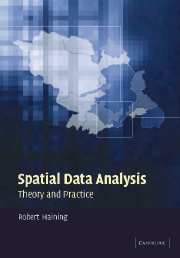Book contents
- Frontmatter
- Contents
- Preface
- Acknowledgements
- Introduction
- Part A The context for spatial data analysis
- Part B Spatial data: obtaining data and quality issues
- Part C The exploratory analysis of spatial data
- Part D Hypothesis testing and spatial autocorrelation
- Part E Modelling spatial data
- Appendix I Software
- Appendix II Cambridgeshire lung cancer data
- Appendix III Sheffield burglary data
- Appendix IV Children excluded from school: Sheffield
- References
- Index
Preface
Published online by Cambridge University Press: 06 July 2010
- Frontmatter
- Contents
- Preface
- Acknowledgements
- Introduction
- Part A The context for spatial data analysis
- Part B Spatial data: obtaining data and quality issues
- Part C The exploratory analysis of spatial data
- Part D Hypothesis testing and spatial autocorrelation
- Part E Modelling spatial data
- Appendix I Software
- Appendix II Cambridgeshire lung cancer data
- Appendix III Sheffield burglary data
- Appendix IV Children excluded from school: Sheffield
- References
- Index
Summary
Interest in analysing spatial data has grown considerably in the scientific research community. This reflects the existence of well-formulated questions or hypothesis in which location plays a role, of spatial data of sufficient quality, of appropriate statistical methodology.
In writing this book I have drawn on a number of scientific and also policy-related fields to illustrate the scale of interest – actual and potential – in analysing spatial data. In seeking to provide this overview of the field I have given a prominent place to two fields of research: Geographic Information Science (GISc) and applied spatial statistics.
It is important as part of the process of understanding the results of spatial data analysis to define the relationship between geographic reality and how that reality is captured in a digital database in the form of a data matrix containing both attribute data and data on locations. The usefulness of operations on that data matrix – revising or improving an initial representation (e.g. spatial smoothing), testing hypotheses (e.g. does this map pattern contain spatial clusters of events?) or fitting models (e.g. to explain offence patterns or health outcomes in terms of socio-economic covariates) – will depend on how well the reality that is being represented has been captured in the data matrix. Awareness of this link is important and insights can be drawn from the GISc literature.
Information
- Type
- Chapter
- Information
- Spatial Data AnalysisTheory and Practice, pp. xv - xviPublisher: Cambridge University PressPrint publication year: 2003
